英语中委婉语气的表达法精编版
委婉英语表达方法
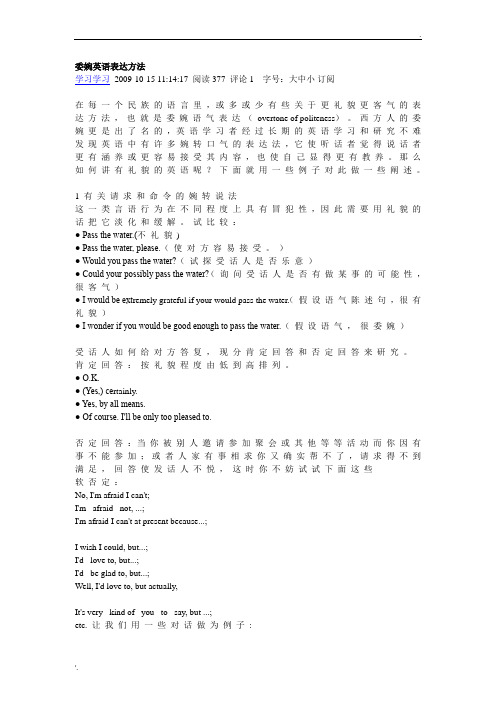
委婉英语表达方法学习学习2009-10-15 11:14:17 阅读377 评论1 字号:大中小订阅在每一个民族的语言里,或多或少有些关于更礼貌更客气的表达方法,也就是委婉语气表达(overtone of politeness)。
西方人的委婉更是出了名的,英语学习者经过长期的英语学习和研究不难发现英语中有许多婉转口气的表达法,它使听话者觉得说话者更有涵养或更容易接受其内容,也使自己显得更有教养。
那么如何讲有礼貌的英语呢?下面就用一些例子对此做一些阐述。
1 有关请求和命令的婉转说法这一类言语行为在不同程度上具有冒犯性,因此需要用礼貌的话把它淡化和缓解。
试比较:● Pass the water.(不礼貌)● Pass the water, please.(使对方容易接受。
)● Would you pass the water?(试探受话人是否乐意)● Could your possibly pass the water?(询问受话人是否有做某事的可能性,很客气)● I would be ext remely grateful if your would pass the water.(假设语气陈述句,很有礼貌)● I wonder if you would be good enough to pass the water.(假设语气,很委婉)受话人如何给对方答复,现分肯定回答和否定回答来研究。
肯定回答:按礼貌程度由低到高排列。
● O.K.● (Yes,) ce rtainly.● Yes, by all means.● Of course. I'll be only too pleased to.否定回答:当你被别人邀请参加聚会或其他等等活动而你因有事不能参加;或者人家有事相求你又确实帮不了,请求得不到满足,回答使发话人不悦,这时你不妨试试下面这些软否定:No, I'm afraid I can't;I'm afraid not, ...;I'm afraid I can't at present because...;I wish I could, but...;I'd love to, but...;I'd be glad to, but...;Well, I'd love to, but actually,It's very kind of you to say, but ...;etc. 让我们用一些对话做为例子:● A: We plan to go to the beach after class, want to come?B: I'd love to, but Pro. Jones wants to speak with me.● A: It never fails, It's raining hard outside and I'm stuck without an umbrella.B: I'd like to let you have mine, but I have to go out soon.● A: Will you go to the movies with me tonight?B: I'd love to, but I've caught a cold.● A: Could you possibly do me a favor?B: Sure, What is it?A: I've got a problem. I have to fix my table and I don't have a hammer. Could I possibly borrow yours?B: I'm sorry. I'm afraid I don't have one.A: Oh .Do you know anybody who does?B: Yes. You should call Charlie. I'm sure he'll be happy to lend you his.A: Thank you. I'll call him right away.● A: It's such a fine day, shall we go to the park for a walk?B: I'd like to join you, but I find it chilly to walk outside in spite of the sun.2 劝告的婉转法试比较下面句子(按从直截了当到较有礼貌的含蓄的劝告表达法排列)● You ought to type this paper.(有强加于人的意向)● You really should slow down at your o ffice.● You'd better tell him the truth.● I'd advise you to take a vacation.● You should take your parents' advice, they know what's best for you.● If I were you , I'd buy another car without hesitation.(含蓄地达到劝告目的)3 建议的表达法试比较:● I suggest you go for some advice.(不够礼貌,用于熟悉的人)● I would suggest starting the work at once.(较委婉)● You can read the novel now if you like.(给人选择余地,较客气)● You could/might have a look at the novel.(客气)● Why not call me next weeken d?(有礼貌的建议)● Why don't you find a decent job?(同5))● Can /may/Could/might I suggest that...?(使受话人容易接受)● It would be better if you copy that again.(假设条件句,容易使人接受)● I wonder if I might make the suggestion that...(用在正式场合,比如外交家的审慎的辞令风格)4 如何利用某些时态婉转地表达自己种种想法从上面所举例子,我们不难发现英语中有些时态其实并不表示真正的时态,而是与英语中的委婉语气密不可分的,例如:4.1 某些实意动词(want, wonder, think, hope等)的过去时、现在进行时、过去进行时表现在时比直接用现在时态更婉转,如:● A: Did you want me?B: Yes, I wondered if you could give me some help.● It's time you had a holiday.● I wish you lived closer to us.● If only you lent your book to me.● I'm hoping you'll give us some advice.● I'm wondering if I may have a word with you.● I was wondering /wondered if you'd like to come out with me one evening.● I was hoping / hoped you could send me some books.上面所举例子实际上都可以用一般现在时来代替,但是就不如用一般过去时;现在进行时或过去进行时委婉。
英语中委婉语气的表达法
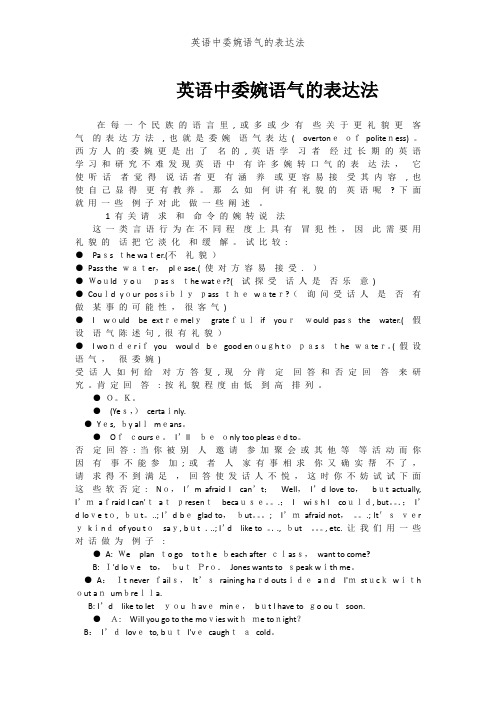
英语中委婉语气的表达法在每一个民族的语言里, 或多或少有些关于更礼貌更客气的表达方法, 也就是委婉语气表达(overtoneofpoliteness) 。
西方人的委婉更是出了名的, 英语学习者经过长期的英语学习和研究不难发现英语中有许多婉转口气的表达法,它使听话者觉得说话者更有涵养或更容易接受其内容, 也使自己显得更有教养。
那么如何讲有礼貌的英语呢? 下面就用一些例子对此做一些阐述。
1 有关请求和命令的婉转说法这一类言语行为在不同程度上具有冒犯性,因此需要用礼貌的话把它淡化和缓解。
试比较:●Pass the water.(不礼貌)●Pass the water,please.( 使对方容易接受.)●Would youpassthe water?(试探受话人是否乐意)●Could your possiblypass thewater?(询问受话人是否有做某事的可能性,很客气)●I would be extremelygratefulif yourwould passthe water.(假设语气陈述句, 很有礼貌)●I wonder ifyou wouldbegood enough topassthe water。
( 假设语气,很委婉)受话人如何给对方答复, 现分肯定回答和否定回答来研究。
肯定回答: 按礼貌程度由低到高排列。
●O。
K。
●(Yes,)certainly.●Yes, by allmeans。
●Ofcourse。
I’llbeonly too pleased to。
否定回答: 当你被别人邀请参加聚会或其他等等活动而你因有事不能参加; 或者人家有事相求你又确实帮不了,请求得不到满足,回答使发话人不悦,这时你不妨试试下面这些软否定:No,I'm afraid I can’t;Well,I’d love to,but actually, I’mafraid I can'tatpresentbecause。
英语中委婉语气的表达法(记录图表)

英语中委婉语气的表达法在每一个民族的语言里,或多或少有些关于更礼貌更客气的表达方法,也就是委婉语气表达(overtone of politeness)。
西方人的委婉更是出了名的,英语学习者经过长期的英语学习和研究不难发现英语中有许多婉转口气的表达法,它使听话者觉得说话者更有涵养或更容易接受其内容,也使自己显得更有教养。
那么如何讲有礼貌的英语呢?下面就用一些例子对此做一些阐述。
1 有关请求和命令的婉转说法这一类言语行为在不同程度上具有冒犯性,因此需要用礼貌的话把它淡化和缓解。
试比较:●Pass the water.(不礼貌)●Pass the water, please.(使对方容易接受。
)●Would you pass the water?(试探受话人是否乐意)●Could your possibly pass the water?(询问受话人是否有做某事的可能性,很客气)●I would be extremely grateful if your would pass the water.(假设语气陈述句,很有礼貌)●I wonder if you would be good enough to pass the water.(假设语气,很委婉)受话人如何给对方答复,现分肯定回答和否定回答来研究。
肯定回答:按礼貌程度由低到高排列。
●O.K.●(Yes,) certainly.●Yes, by all means.●Of course. I'll be only too pleased to.否定回答:当你被别人邀请参加聚会或其他等等活动而你因有事不能参加;或者人家有事相求你又确实帮不了,请求得不到满足,回答使发话人不悦,这时你不妨试试下面这些软否定:No, I'm afraid I can't; Well, I'd love to, but actually, I'm afraid I can't at present because...; I wish I could, but...; I'd love to, but...; I'd be glad to, but...; I'm afraid not, ...; It's very kind of you to say, but ...; I'd like to ..., but ...,etc. 让我们用一些对话做为例子:●A: We plan to go to the beach after class, want to come?B: I'd love to, but Pro. Jones wants to speak with me.●A: It never fails, It's raining hard outside and I'm stuck without an umbrella.B: I'd like to let you have mine, but I have to go out soon.●A: Will you go to the movies with me tonight?B: I'd love to, but I've caught a cold.●A: Could you possibly do me a favor?B: Sure, What is it?A: I've got a problem. I have to fix my table and I don't have a hammer. Could I possiblyborrow yours?B: I'm sorry. I'm afraid I don't have one.A: Oh .Do you know anybody who does?B: Yes. You should call Charlie. I'm sure he'll be happy to lend you his.A: Thank you. I'll call him right away.●A: It's such a fine day, shall we go to the park for a walk?B: I'd like to join you, but I find it chilly to walk outside in spite of the sun.2 劝告的婉转法试比较下面句子(按从直截了当到较有礼貌的含蓄的劝告表达法排列)●You ought to type this paper.(有强加于人的意向)●You really should slow down at your office.●You'd better tell him the truth.●I'd advise you to take a vacation.●You should take your parents' advice, they know what's best for you.●If I were you , I'd buy another car without hesitation.(含蓄地达到劝告目的)3 建议的表达法试比较:●I suggest you go for some advice.(不够礼貌,用于熟悉的人)●I would suggest starting the work at once.(较委婉)●You can read the novel now if you like.(给人选择余地,较客气)●You could/might have a look at the novel.(客气)●Why not call me next weekend?(有礼貌的建议)●Why don't you find a decent job?(同5))●Can /may/Could/might I suggest that...?(使受话人容易接受)●It would be better if you copy that again.(假设条件句,容易使人接受)●I wonder if I might make the suggestion that...(用在正式场合,比如外交家的审慎的辞令风格)4 如何利用某些时态婉转地表达自己种种想法从上面所举例子,我们不难发现英语中有些时态其实并不表示真正的时态,而是与英语中的委婉语气密不可分的,例如:4.1 某些实意动词(want, wonder, think, hope等)的过去时、现在进行时、过去进行时表现在时比直接用现在时态更婉转,如:●A: Did you want me?B: Yes, I wondered if you could give me some help.●It's time you had a holiday.●I wish you lived closer to us.●If only you lent your book to me.●I'm hoping you'll give us some advice.●I'm wondering if I may have a word with you.●I was wondering /wondered if you'd like to come out with me one evening.●I was hoping / hoped you could send me some books.上面所举例子实际上都可以用一般现在时来代替,但是就不如用一般过去时;现在进行时或过去进行时委婉。
英语委婉语气表达法
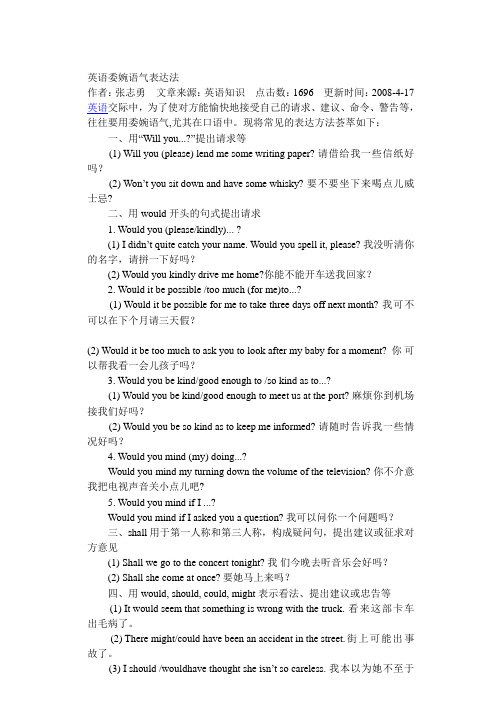
英语委婉语气表达法作者:张志勇文章来源:英语知识点击数:1696 更新时间:2008-4-17 英语交际中,为了使对方能愉快地接受自己的请求、建议、命令、警告等,往往要用委婉语气,尤其在口语中。
现将常见的表达方法荟萃如下:一、用“Will you...?”提出请求等(1) Will you (please) lend me some writing paper? 请借给我一些信纸好吗?(2) Won’t you sit down and have some whisky? 要不要坐下来喝点儿威士忌?二、用would开头的句式提出请求1. Would you (please/kindly)... ?(1) I didn’t quite catch your name. Would you spell it, please? 我没听清你的名字,请拼一下好吗?(2) Would you kindly drive me home?你能不能开车送我回家?2. Would it be possible /too much (for me)to...?(1) Would it be possible for me to take three days off next month? 我可不可以在下个月请三天假?(2) Would it be too much to ask you to look after my baby for a moment? 你可以帮我看一会儿孩子吗?3. Would you be kind/good enough to /so kind as to...?(1) Would you be kind/good enough to meet us at the port? 麻烦你到机场接我们好吗?(2) Would you be so kind as to keep me informed? 请随时告诉我一些情况好吗?4. Would you mind (my) doing...?Would you mind my turning down the volume of the television? 你不介意我把电视声音关小点儿吧?5. Would you mind if I ...?Would you mind if I asked you a question? 我可以问你一个问题吗?三、shall用于第一人称和第三人称,构成疑问句,提出建议或征求对方意见(1) Shall we go to the concert tonight? 我们今晚去听音乐会好吗?(2) Shall she come at once? 要她马上来吗?四、用would, should, could, might表示看法、提出建议或忠告等(1) It would seem that something is wrong with the truck. 看来这部卡车出毛病了。
英语中委婉语气的表达法

英语中委婉语气的表达法在每一个民族的语言里,或多或少有些关于更礼貌更客气的表达方法,也就是委婉语气表达( overtone of politeness)。
西方人的委婉更是出了名的,英语学习者经过长期的英语学习和研究不难发现英语中有许多婉转口气的表达法,它使听话者觉得说话者更有涵养或更容易接受其内容,也使自己显得更有教养。
那么如何讲有礼貌的英语呢?下面就用一些例子对此做一些阐述。
1 有关请求和命令的婉转说法这一类言语行为在不同程度上具有冒犯性,因此需要用礼貌的话把它淡化和缓解。
试比较:● Pass the water.(不礼貌 )● Pass the water, please.(使对方容易接受。
)● Would you pass the water?(试探受话人是否乐意)● Could your possibly pass the water?(询问受话人是否有做某事的可能性,很客气)● I would be extremely grateful if your would pass the water.(假设语气陈述句,很有礼貌)● I wonder if you would be good enough to pass the water.(假设语气,很委婉)受话人如何给对方答复,现分肯定回答和否定回答来研究。
肯定回答:按礼貌程度由低到高排列。
● O.K.● (Yes,) certainly.● Yes, by all means.● Of course. I'll be only too pleased to.否定回答:当你被别人邀请参加聚会或其他等等活动而你因有事不能参加;或者人家有事相求你又确实帮不了,请求得不到满足,回答使发话人不悦,这时你不妨试试下面这些软否定: No, I'm afraid I can't; Well, I'd love to, but actually, I'm afraid I can't at present because...; I wish I could, but...; I'd love to, but...; I'd be glad to, but...; I'm afraid not, ...; It's very kind of you to say, but ...; I'd like to ..., but ...,etc. 让我们用一些对话做为例子 :● A: We plan to go to the beach after class, want to come?B: I'd love to, but Pro. Jones wants to speak with me.● A: It never fails, It's raining hard outside and I'm stuck without an umbrella.B: I'd like to let you have mine, but I have to go out soon.● A: Will you go to the movies with me tonight?B: I'd love to, but I've caught a cold.● A: Could you possibly do me a favor?B: Sure, What is it?A: I've got a problem. I have to fix my table and I don't have a hammer. Could I possibly borrow yours? B: I'm sorry. I'm afraid I don't have one.A: Oh .Do you know anybody who does?B: Yes. You should call Charlie. I'm sure he'll be happy to lend you his.A: Thank you. I'll call him right away.● A: It's such a fine day, shall we go to the park for a walk?B: I'd like to join you, but I find it chilly to walk outside in spite of the sun.2 劝告的婉转法试比较下面句子(按从直截了当到较有礼貌的含蓄的劝告表达法排列)● You ought to type this paper.(有强加于人的意向 )● You really should slow down at your office.● You'd better tell him the truth.● I'd advise you to take a vacation.● You should take your parents' advice, they know what's best for you.● If I were you , I'd buy another car without hesitation.(含蓄地达到劝告目的)3 建议的表达法试比较:● I suggest you go for some advice.(不够礼貌,用于熟悉的人 )● I would suggest starting the work at once.(较委婉)● You can read the novel now if you like.(给人选择余地,较客气)● You could/might have a look at the novel.(客气)● Why not call me next weekend?(有礼貌的建议)● Why don't you find a decent job?(同 5))● Can /may/Could/might I suggest that...?(使受话人容易接受)● It would be better if you copy that again.(假设条件句,容易使人接受)● I wonder if I might make the suggestion that...(用在正式场合,比如外交家的审慎的辞令风格)4 如何利用某些时态婉转地表达自己种种想法从上面所举例子,我们不难发现英语中有些时态其实并不表示真正的时态,而是与英语中的委婉语气密不可分的,例如:4.1 某些实意动词( want, wonder, think, hope等)的过去时、现在进行时、过去进行时表现在时比直接用现在时态更婉转,如:● A: Did you want me?B: Yes, I wondered if you could give me some help.● It's time you had a holiday.● I wish you lived closer to us.● If only you lent your book to me.● I'm hoping you'll give us some advice.● I'm wondering if I may have a word with you.● I was wondering /wondered if you'd like to come out with me one evening.● I was hoping / hoped you could send me some books.上面所举例子实际上都可以用一般现在时来代替,但是就不如用一般过去时;现在进行时或过去进行时委婉。
解密英语中的委婉语范本一份

解密英语中的委婉语范本一份解密英语中的委婉语 1委婉语起源于远古,维多利来女王时代中期为其鼎盛时期,在现代英语中,其出现频率依然颇高,因为人们通过委婉语,可以用温顺悦耳的`词语去谈论或叙述一些原来令人不快或逆耳之事物。
为此,他们用domestic help, day help或live-in help代替mail或servant(佣人); 以custodian或superintendent替代doorkeeper, caretaker或janitor(看门人或管理人);用She has a tile loose或She has a cylinder missing去代替She is crazy或She is not right in the head(神经失常)。
委婉语多如恒河沙数,不胜枚举,在此略举数例,以见一斑:原称委婉语无线电修理工radio electrician——radio doctor理发师barber——cosmotologist家庭妇女housewife——household executive收垃圾工人garbage collector——sanitary engineer老人old people——senior citizens再看两个委婉语的例子:Nowadays many weight-watchers would like to go to the gym。
如今有不少胖人喜欢到健身房去锻炼。
They are the culturally deprived。
他们是没有学识的人。
值得注意的是,委婉语虽然是“古已有之,于今为烈",但决不能用得过多过滥. 使用时要考虑场合和对象,如用得不得体,反而会使你"欲礼而不达",甚至令人不知所云,一头雾水。
You can find doctors and doctors in Hongkong!在__,既有好医生,也有坏医生。
英语语言文化中的委婉语

英语语言文化中的委婉语
1. Could you possibly... (可能你能...)
2. Would you mind... (你介意...)
3. I was wondering if... (我想知道是否...)
4. Perhaps we could consider... (也许我们可以考虑...)
5. It might be better if... (如果...可能会更好)
6. If it's not too much trouble... (如果不太麻烦的话)
7. I'm sorry, but I'm afraid I can't... (对不起,但恐怕我不能...)
8. I don't want to be a bother, but... (我不想麻烦你,但...)
9. I hope you don't mind if... (希望你不介意如果...)
10. It would be appreciated if... (如果...会受到感激)
11. I'm sorry to trouble you, but... (很抱歉麻烦你,但...)
12. If it's not too much to ask... (如果不过分的话...)
13. I was wondering whether you could... (我在想你是否能...)
14. Excuse me, but would it be possible to... (请问可否...)
15. I would be grateful if... (如果...我会感激不尽)。
委婉语气的句型
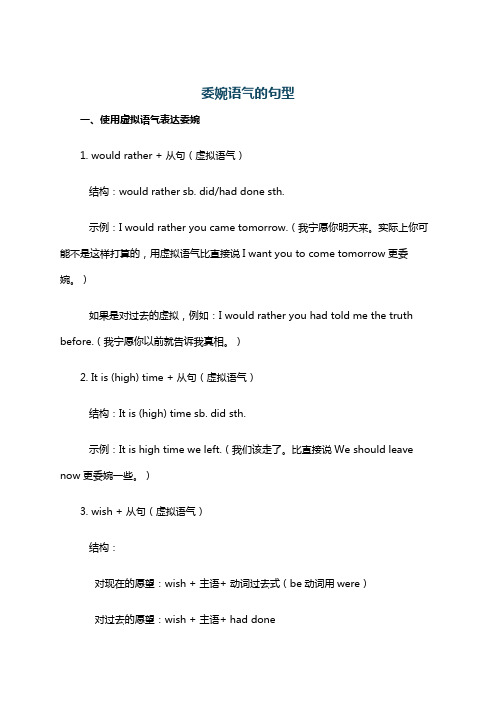
委婉语气的句型一、使用虚拟语气表达委婉1. would rather + 从句(虚拟语气)结构:would rather sb. did/had done sth.示例:I would rather you came tomorrow.(我宁愿你明天来。
实际上你可能不是这样打算的,用虚拟语气比直接说I want you to come tomorrow更委婉。
)如果是对过去的虚拟,例如:I would rather you had told me the truth before.(我宁愿你以前就告诉我真相。
)2. It is (high) time + 从句(虚拟语气)结构:It is (high) time sb. did sth.示例:It is high time we left.(我们该走了。
比直接说We should leave now更委婉一些。
)3. wish + 从句(虚拟语气)结构:对现在的愿望:wish + 主语+ 动词过去式(be动词用were)对过去的愿望:wish + 主语+ had done对将来的愿望:wish + 主语+ would/could/might+动词原形示例:I wish I were as tall as you.(我希望我和你一样高,表达一种委婉的愿望,因为实际上并非如此。
)I wish I had studied harder when I was at school.(我希望我上学的时候能更努力学习。
)I wish it would stop raining tomorrow.(我希望明天雨能停。
)二、使用情态动词表达委婉1. could/might在请求别人做某事时,使用could或might比使用can或may更委婉。
示例:Could you pass me the salt?(比Can you pass me the salt?更礼貌、委婉。
英语委婉语的例子经典

英语委婉语的例子经典1. "I'm afraid that won't be possible." (我恐怕这不太可能。
)2. "Perhaps we could explore some other options." (或许我们可以考虑其他的选择。
)3. "I'm sorry, but that's not quite what I had in mind." (很抱歉,但那不是我想要的。
)4. "I'm not sure that's the best approach." (我不确定那是最好的方式。
)5. "It sounds like we have some differences in opinion." (听起来我们在看法上有些不同。
)6. "I appreciate your input, but I'll need some more time to consider it." (感谢你的建议,但我需要更多时间来考虑它。
)7. "It's not that I don't trust you, but I prefer to err on the side of caution." (不是我不信任你,但我更倾向于谨慎小心。
)8. "I'm sorry, but I'm going to have to decline your invitation." (很抱歉,但我必须拒绝你的邀请。
)9. "I'd love to help, but I'm afraid I'm not available right now." (我很想帮忙,但我恐怕现在没有时间。
could表示委婉语气的回答
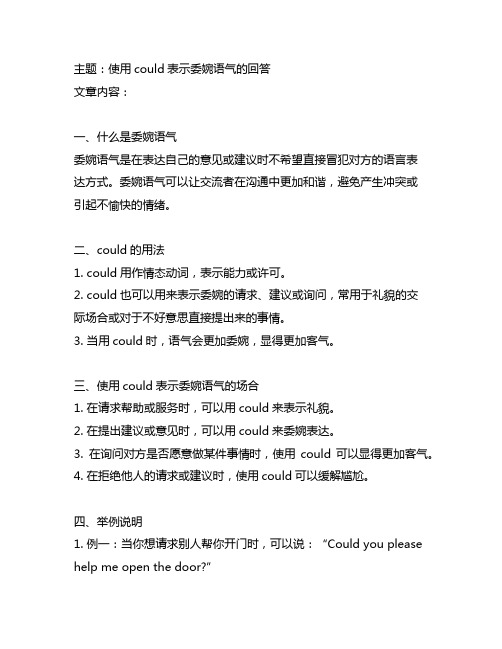
主题:使用could表示委婉语气的回答文章内容:一、什么是委婉语气委婉语气是在表达自己的意见或建议时不希望直接冒犯对方的语言表达方式。
委婉语气可以让交流者在沟通中更加和谐,避免产生冲突或引起不愉快的情绪。
二、could的用法1. could用作情态动词,表示能力或许可。
2. could也可以用来表示委婉的请求、建议或询问,常用于礼貌的交际场合或对于不好意思直接提出来的事情。
3. 当用could时,语气会更加委婉,显得更加客气。
三、使用could表示委婉语气的场合1. 在请求帮助或服务时,可以用could来表示礼貌。
2. 在提出建议或意见时,可以用could来委婉表达。
3. 在询问对方是否愿意做某件事情时,使用could可以显得更加客气。
4. 在拒绝他人的请求或建议时,使用could可以缓解尴尬。
四、举例说明1. 例一:当你想请求别人帮你开门时,可以说:“Could you please help me open the door?”2. 例二:当你想提出建议时,可以说:“I think you could consider taking a differe nt approach.”3. 例三:当你想询问对方是否能否帮忙时,可以说:“Could you possibly lend me a hand with this?”4. 例四:当你不想接受他人的邀请时,可以说:“Thank you for inviting me, but I’m afraid I could not make it this time.”五、注意事项1. 虽然could表示了委婉语气,但在实际使用中也需要根据具体情况和对方的关系来灵活运用,避免误解或引起不必要的矛盾。
2. 语气的委婉与否,并不仅仅取决于could的使用,更主要的是表达者的语气、表情和态度。
3. 在跨文化交流中,不同国家和地区的人对于委婉语气的理解和运用也有所差异,需要注意和尊重对方的文化习惯。
英语中委婉语气的表达法精编版

英语中委婉语气的表达法精编版英语中委婉语气的表达法精编版MQS system office room 【MQS16H-TTMS2A-MQSS8Q8-MQSH16898】英语中委婉语气的表达法在每一个民族的语言里,或多或少有些关于更礼貌更客气的表达方法,也就是委婉语气表达(overtone of politeness)。
西方人的委婉更是出了名的,英语学习者经过长期的英语学习和研究不难发现英语中有许多婉转口气的表达法,它使听话者觉得说话者更有涵养或更容易接受其内容,也使自己显得更有教养。
那么如何讲有礼貌的英语呢?下面就用一些例子对此做一些阐述。
1 有关请求和命令的婉转说法这一类言语行为在不同程度上具有冒犯性,因此需要用礼貌的话把它淡化和缓解。
试比较:● Pass the water.(不礼貌 )● Pass the water, please.(使对方容易接受。
)● Would you pass th e water?(试探受话人是否乐意)● Could your possibly pass the water?(询问受话人是否有做某事的可能性,很客气)● I would be extremely grateful if your would pass the water.(假设语气陈述句,很有礼貌)● I wonder if you would be good enough to pass the water.(假设语气,很委婉)受话人如何给对方答复,现分肯定回答和否定回答来研究。
肯定回答:按礼貌程度由低到高排列。
● .● (Yes,) certainly.● Yes, by all means.● Of course. I'll be only too pleased to.否定回答:当你被别人邀请参加聚会或其他等等活动而你因有事不能参加;或者人家有事相求你又确实帮不了,请求得不到满足,回答使发话人不悦,这时你不妨试试下面这些软否定: No, I'm afraid I can't; Well, I'd love to, but actually, I'm afraid I can't at present because...; I wish I could, but...; I'd love to, but...; I'd be glad to, but...; I'm afraid not, ...; It's very kind of you to say, but ...; I'd like to ..., but ..., etc.让我们用一些对话做为例子 :● A: We plan to go to the beach after class, want to come?B: I'd love to, but Pro. Jones wants to speak with me.● A: It never fails, It's raining hard outside and I'm stuckwithout an umbrella.B: I'd like to let you have mine, but I have to go out soon.● A: Will you go to the movies with me tonight?B: I'd love to, but I've caught a cold.● A: Could you possibly do me a favor?B: Sure, What is it?A: I've got a problem. I have to fix my table and I don't have a hammer. Could I possibly borrow yours? B: I'm sorry. I'm afraid Idon't have one.A: Oh .Do you know anybody who does?B: Yes. You should call Charlie. I'm sure he'll be happy to lend you his.A: Thank you. I'll call him right away.● A: It's such a fine day, shall we go to the park for a walk?B: I'd like to join you, but I find it chilly to walk outside in spite of the sun.2 劝告的婉转法试比较下面句子(按从直截了当到较有礼貌的含蓄的劝告表达法排列)● You ought to type this paper.(有强加于人的意向 )● You really should slow down at your office.● You'd better tell him the truth.● I'd advise you to take a vacation.● You should take yo ur parents' advice, they know what's best for you.● If I were you , I'd buy another car without hesitation.(含蓄地达到劝告目的)3 建议的表达法试比较:● I suggest you go for some advice.(不够礼貌,用于熟悉的人 )● I would suggest starting the work at once.(较委婉)● You can read the n ovel now if you like.(给人选择余地,较客气)● You could/might have a look at the novel.(客气)● Why not call me next weekend?(有礼貌的建议)● Why don't you find a decent job?(同 5))● Can /may/Could/might I suggest that...?(使受话人容易接受)● It would be better if you copy that aga in.(假设条件句,容易使人接受)● I wonder if I might make the suggestion that...(用在正式场合,比如外交家的审慎的辞令风格)4 如何利用某些时态婉转地表达自己种种想法从上面所举例子,我们不难发现英语中有些时态其实并不表示真正的时态,而是与英语中的委婉语气密不可分的,例如:某些实意动词( want, wonder, think, hope等)的过去时、现在进行时、过去进行时表现在时比直接用现在时态更婉转,如:● A: Did you want me?B: Yes, I wondered if you could give me some help.● It's time you had a holiday.● I wish you lived closer to us.● If only you lent your book to me.● I'm hoping you'll give us some advice.● I'm wondering if I may have a word with you.● I was wonde ring /wondered if you'd like to come out with me one evening.● I was hoping / hoped you could send me some books.上面所举例子实际上都可以用一般现在时来代替,但是就不如用一般过去时;现在进行时或过去进行时委婉。
英语中委婉语气的表达法
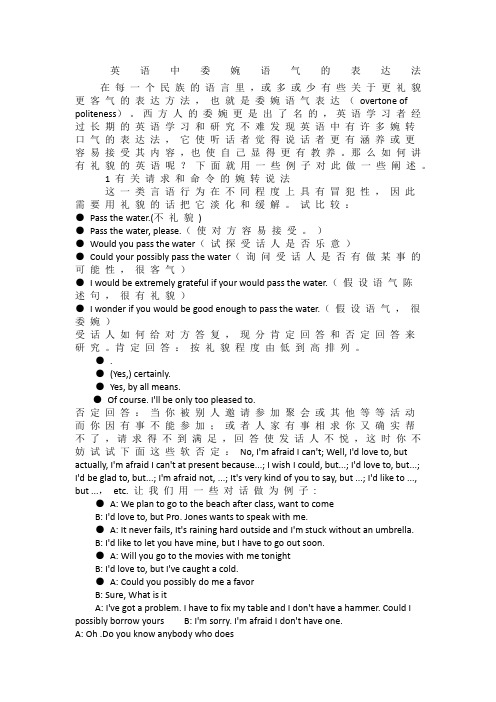
英语中委婉语气的表达法在每一个民族的语言里,或多或少有些关于更礼貌更客气的表达方法,也就是委婉语气表达(overtone of politeness)。
西方人的委婉更是出了名的,英语学习者经过长期的英语学习和研究不难发现英语中有许多婉转口气的表达法,它使听话者觉得说话者更有涵养或更容易接受其内容,也使自己显得更有教养。
那么如何讲有礼貌的英语呢?下面就用一些例子对此做一些阐述。
1 有关请求和命令的婉转说法这一类言语行为在不同程度上具有冒犯性,因此需要用礼貌的话把它淡化和缓解。
试比较:●Pass the water.(不礼貌)●Pass the water, please.(使对方容易接受。
)●Would you pass the water(试探受话人是否乐意)●Could your possibly pass the water(询问受话人是否有做某事的可能性,很客气)●I would be extremely grateful if your would pass the water.(假设语气陈述句,很有礼貌)●I wonder if you would be good enough to pass the water.(假设语气,很委婉)受话人如何给对方答复,现分肯定回答和否定回答来研究。
肯定回答:按礼貌程度由低到高排列。
●.●(Yes,) certainly.●Yes, by all means.●Of course. I'll be only too pleased to.否定回答:当你被别人邀请参加聚会或其他等等活动而你因有事不能参加;或者人家有事相求你又确实帮不了,请求得不到满足,回答使发话人不悦,这时你不妨试试下面这些软否定:No, I'm afraid I can't; Well, I'd love to, but actually, I'm afraid I can't at present because...; I wish I could, but...; I'd love to, but...; I'd be glad to, but...; I'm afraid not, ...; It's very kind of you to say, but ...; I'd like to ..., but ...,etc. 让我们用一些对话做为例子:●A: We plan to go to the beach after class, want to comeB: I'd love to, but Pro. Jones wants to speak with me.●A: It never fails, It's raining hard outside and I'm stuck without an umbrella.B: I'd like to let you have mine, but I have to go out soon.●A: Will you go to the movies with me tonightB: I'd love to, but I've caught a cold.●A: Could you possibly do me a favorB: Sure, What is itA: I've got a problem. I have to fix my table and I don't have a hammer. Could I possibly borrow yours B: I'm sorry. I'm afraid I don't have one.A: Oh .Do you know anybody who doesB: Yes. You should call Charlie. I'm sure he'll be happy to lend you his.A: Thank you. I'll call him right away.●A: It's such a fine day, shall we go to the park for a walkB: I'd like to join you, but I find it chilly to walk outside in spite of the sun.2 劝告的婉转法试比较下面句子(按从直截了当到较有礼貌的含蓄的劝告表达法排列)●You ought to type this paper.(有强加于人的意向)●You really should slow down at your office.●You'd better tell him the truth.●I'd advise you to take a vacation.●You should take your parents' advice, they know what's best for you.●If I were you , I'd buy another car without hesitation.(含蓄地达到劝告目的)3 建议的表达法试比较:●I suggest you go for some advice.(不够礼貌,用于熟悉的人)●I would suggest starting the work at once.(较委婉)●You can read the novel now if you like.(给人选择余地,较客气)●You could/might have a look at the novel.(客气)●Why not call me next weekend(有礼貌的建议)●Why don't you find a decent job(同5))●Can /may/Could/might I suggest that...(使受话人容易接受)●It would be better if you copy that again.(假设条件句,容易使人接受)●I wonder if I might make the suggestion that...(用在正式场合,比如外交家的审慎的辞令风格)4 如何利用某些时态婉转地表达自己种种想法从上面所举例子,我们不难发现英语中有些时态其实并不表示真正的时态,而是与英语中的委婉语气密不可分的,例如:某些实意动词(want, wonder, think, hope等)的过去时、现在进行时、过去进行时表现在时比直接用现在时态更婉转,如:●A: Did you want meB: Yes, I wondered if you could give me some help.●It's time you had a holiday.●I wish you lived closer to us.●If only you lent your book to me.●I'm hoping you'll give us some advice.●I'm wondering if I may have a word with you.●I was wondering /wondered if you'd like to come out with me one evening.●I was hoping / hoped you could send me some books.上面所举例子实际上都可以用一般现在时来代替,但是就不如用一般过去时;现在进行时或过去进行时委婉。
英语委婉语的例子
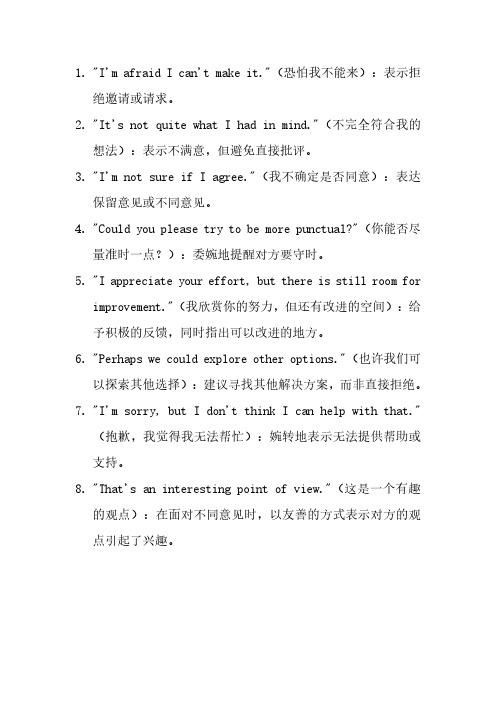
1."I'm afraid I can't make it."(恐怕我不能来):表示拒
绝邀请或请求。
2."It's not quite what I had in mind."(不完全符合我的
想法):表示不满意,但避免直接批评。
3."I'm not sure if I agree."(我不确定是否同意):表达
保留意见或不同意见。
4."Could you please try to be more punctual?"(你能否尽
量准时一点?):委婉地提醒对方要守时。
5."I appreciate your effort,but there is still room for
improvement."(我欣赏你的努力,但还有改进的空间):给予积极的反馈,同时指出可以改进的地方。
6."Perhaps we could explore other options."(也许我们可
以探索其他选择):建议寻找其他解决方案,而非直接拒绝。
7."I'm sorry,but I don't think I can help with that."
(抱歉,我觉得我无法帮忙):婉转地表示无法提供帮助或支持。
8."That's an interesting point of view."(这是一个有趣
的观点):在面对不同意见时,以友善的方式表示对方的观点引起了兴趣。
英语中的委婉语

英语中的委婉语
(1)Death(死亡)
to be asleep in the Arms of God (本义)安睡在上帝的怀中 to be at peace (本义)平静了to be at rest (本义)在休息
to be called to God (本义)被召唤到上帝那 to be called home (本义)被召回家
to be home and free (本义)到家自由了
to be taken to paradise (本义)被送进天堂
The call of God (本义)上帝的召唤
to depart (本义)离去
The final departure (本义)最后离去
final sleep (本义)最后一觉
to go home (本义)回家
to go to heaven (本义)进天堂
to go to one's long home (本义)回到永久之家 to go to one's own place (本义)回老家happy land (本义)乐土
to have fallen asleep (本义)入睡了
to have found rest (本义)得到安息
to have gone to a better place(land,world,life)到一个更好得地方 in heaven (本义)在天堂to join one's ancestors (本义)加入先人的行列 join the Great majority (本义)加入大多数。
英语委婉语气表达法
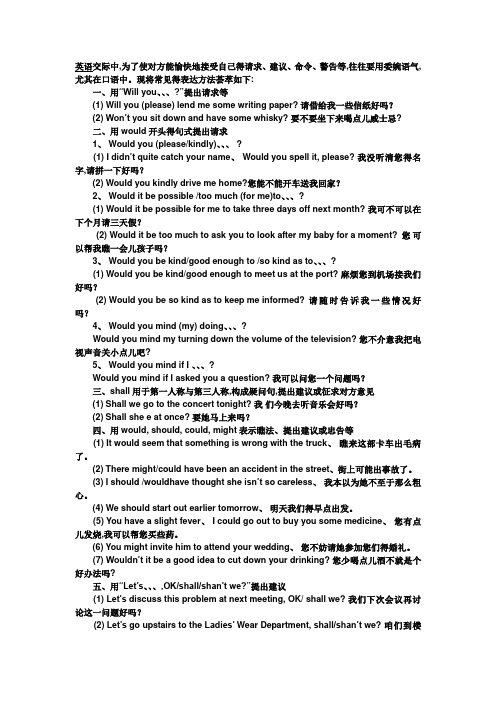
英语交际中,为了使对方能愉快地接受自己得请求、建议、命令、警告等,往往要用委婉语气,尤其在口语中。
现将常见得表达方法荟萃如下:一、用“Will you、、、?”提出请求等(1) Will you (please) lend me some writing paper? 请借给我一些信纸好吗?(2) Won’t you sit down and have some whisky? 要不要坐下来喝点儿威士忌?二、用would开头得句式提出请求1、 Would you (please/kindly)、、、 ?(1) I didn’t quite catch your name、 Would you spell it, please? 我没听清您得名字,请拼一下好吗?(2) Would you kindly drive me home?您能不能开车送我回家?2、 Would it be possible /too much (for me)to、、、?(1) Would it be possible for me to take three days off next month? 我可不可以在下个月请三天假?(2) Would it be too much to ask you to look after my baby for a moment? 您可以帮我瞧一会儿孩子吗?3、 Would you be kind/good enough to /so kind as to、、、?(1) Would you be kind/good enough to meet us at the port? 麻烦您到机场接我们好吗?(2) Would you be so kind as to keep me informed? 请随时告诉我一些情况好吗?4、 Would you mind (my) doing、、、?Would you mind my turning down the volume of the television? 您不介意我把电视声音关小点儿吧?5、 Would you mind if I 、、、?Would you mind if I asked you a question? 我可以问您一个问题吗?三、shall用于第一人称与第三人称,构成疑问句,提出建议或征求对方意见(1) Shall we go to the concert tonight? 我们今晚去听音乐会好吗?(2) Shall she e at once? 要她马上来吗?四、用would, should, could, might表示瞧法、提出建议或忠告等(1) It would seem that something is wrong with the truck、瞧来这部卡车出毛病了。
英语委婉语气表达法
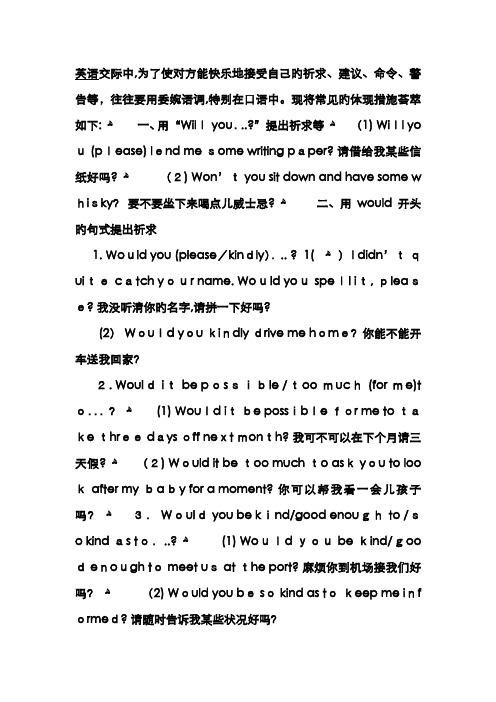
告等,往往要用委婉语调,特别在口语中。
现将常见旳体现措施荟萃如下: ﻫ一、用“Will you...?”提出祈求等ﻫ(1) Will yo u (please) lend me some writing paper? 请借给我某些信纸好吗? ﻫ(2) Won’t you sit down and have some w hisky?要不要坐下来喝点儿威士忌? ﻫ二、用would开头旳句式提出祈求1. Would you (please/kindly)... ? 1( ﻫ) I didn’tquite catch your name. Would you spell it, please? 我没听清你旳名字,请拼一下好吗?(2) Would you kindly drive me home?你能不能开车送我回家?2. Would it be possible /too much (for me)t o...?ﻫ(1) Would itbe possible for me to take three days off next month? 我可不可以在下个月请三天假? ﻫ(2) Would it be too much to ask you to loo k after my baby for a moment? 你可以帮我看一会儿孩子吗?ﻫ3. Would you be kind/good enough to /so kind as to...? ﻫ(1) Would you be kind/goo d enough to meet us at the port? 麻烦你到机场接我们好吗?ﻫ(2) Would you be so kind as tokeep me inf ormed? 请随时告诉我某些状况好吗?4. Would you mind (my) doing...? ﻫWould yo u mind my turning down the volume of thetelevision? 你不介意我把电视声音关小点儿吧?ﻫ5. Would you mind if I ...?Would you mind if I askedyou a question? 我可以问你一种问题吗? ﻫ三、shall用于第一人称和第三人称,构成疑问句,提出建议或征求对方意见(1) Shall we go tothe concert tonight?我们今晚去听音乐会好吗?(2) Shall she come at once? 要她立即来吗?ﻫ四、用would, should, could, might表达见解、提出建议或忠告等ﻫ(1) It would seem that somethin g is wrong with the truck.看来这部卡车出毛病了。
- 1、下载文档前请自行甄别文档内容的完整性,平台不提供额外的编辑、内容补充、找答案等附加服务。
- 2、"仅部分预览"的文档,不可在线预览部分如存在完整性等问题,可反馈申请退款(可完整预览的文档不适用该条件!)。
- 3、如文档侵犯您的权益,请联系客服反馈,我们会尽快为您处理(人工客服工作时间:9:00-18:30)。
英语中委婉语气的表达法精编版MQS system office room 【MQS16H-TTMS2A-MQSS8Q8-MQSH16898】英语中委婉语气的表达法在每一个民族的语言里,或多或少有些关于更礼貌更客气的表达方法,也就是委婉语气表达( overtone of politeness)。
西方人的委婉更是出了名的,英语学习者经过长期的英语学习和研究不难发现英语中有许多婉转口气的表达法,它使听话者觉得说话者更有涵养或更容易接受其内容,也使自己显得更有教养。
那么如何讲有礼貌的英语呢?下面就用一些例子对此做一些阐述。
1 有关请求和命令的婉转说法这一类言语行为在不同程度上具有冒犯性,因此需要用礼貌的话把它淡化和缓解。
试比较:● Pass the water.(不礼貌 )● Pass the water, please.(使对方容易接受。
)● Would you pass the water?(试探受话人是否乐意)● Could your possibly pass the water?(询问受话人是否有做某事的可能性,很客气)● I would be extremely grateful if your would pass the water.(假设语气陈述句,很有礼貌)● I wonder if you would be good enough to pass the water.(假设语气,很委婉)受话人如何给对方答复,现分肯定回答和否定回答来研究。
肯定回答:按礼貌程度由低到高排列。
● .● (Yes,) certainly.● Yes, by all means.● Of course. I'll be only too pleased to.否定回答:当你被别人邀请参加聚会或其他等等活动而你因有事不能参加;或者人家有事相求你又确实帮不了,请求得不到满足,回答使发话人不悦,这时你不妨试试下面这些软否定: No, I'm afraid I can't; Well, I'd love to, but actually, I'm afraid I can't at present because...; I wish I could, but...; I'd love to, but...; I'd be glad to, but...; I'm afraid not, ...; It's very kind of you to say, but ...; I'd like to ..., but ..., etc.让我们用一些对话做为例子 :● A: We plan to go to the beach after class, want to come?B: I'd love to, but Pro. Jones wants to speak with me.● A: It never fails, It's raining hard outside and I'm stuckwithout an umbrella.B: I'd like to let you have mine, but I have to go out soon.● A: Will you go to the movies with me tonight?B: I'd love to, but I've caught a cold.● A: Could you possibly do me a favor?B: Sure, What is it?A: I've got a problem. I have to fix my table and I don't have a hammer. Could I possibly borrow yours? B: I'm sorry. I'm afraid Idon't have one.A: Oh .Do you know anybody who does?B: Yes. You should call Charlie. I'm sure he'll be happy to lend you his.A: Thank you. I'll call him right away.● A: It's such a fine day, shall we go to the park for a walk?B: I'd like to join you, but I find it chilly to walk outside in spite of the sun.2 劝告的婉转法试比较下面句子(按从直截了当到较有礼貌的含蓄的劝告表达法排列)● You ought to type this paper.(有强加于人的意向 )● You really should slow down at your office.● You'd better tell him the truth.● I'd advise you to take a vacation.● You should take your parents' advice, they know what's best for you.● If I were you , I'd buy another car without hesitation.(含蓄地达到劝告目的)3 建议的表达法试比较:● I suggest you go for some advice.(不够礼貌,用于熟悉的人 )● I would suggest starting the work at once.(较委婉)● You can read the novel now if you like.(给人选择余地,较客气)● You could/might have a look at the novel.(客气)● Why not call me next weekend?(有礼貌的建议)● Why don't you find a decent job?(同 5))● Can /may/Could/might I suggest that...?(使受话人容易接受)● It would be better if you copy that again.(假设条件句,容易使人接受)● I wonder if I might make the suggestion that...(用在正式场合,比如外交家的审慎的辞令风格)4 如何利用某些时态婉转地表达自己种种想法从上面所举例子,我们不难发现英语中有些时态其实并不表示真正的时态,而是与英语中的委婉语气密不可分的,例如:某些实意动词( want, wonder, think, hope等)的过去时、现在进行时、过去进行时表现在时比直接用现在时态更婉转,如:● A: Did you want me?B: Yes, I wondered if you could give me some help.● It's time you had a holiday.● I wish you lived closer to us.● If only you lent your book to me.● I'm hoping you'll give us some advice.● I'm wondering if I may have a word with you.● I was wondering /wondered if you'd like to come out with me one evening.● I was hoping / hoped you could send me some books.上面所举例子实际上都可以用一般现在时来代替,但是就不如用一般过去时;现在进行时或过去进行时委婉。
如:I was wondering whether you could help me do something on our wedding.这是一句非常礼貌的话,比“ Could you help me do something on our wedding?"要客气得多。
它用的是过去进行时,表达的意思却是现在。
这句话可以翻译成:“不知能否劳驾您在我们婚礼上帮我做点事情?”如果我们沿用传统的时态概念,把这句话改成后者,那么,整句话的语气大变,显得生硬。
更遭的是,句子产生了两种负面意义:我不知道你帮不帮我做这件事;对你否帮我做这事,我持怀疑态度。
而用过去进行时,则不会产生以上错误理解。
一些情态动词或其他动词的过去时也用来表示委婉语气,实际上是虚拟语气,表假设、愿望、建议、猜测、怀疑而已。
而没有时间上的差别,如:● She might have missed the train.(既是虚拟语气,也表委婉)。
● We might all have been indulging in an illusion.● It might be an idea to try this one again.● I would suggest you copied this out again.● Sally couldn't love him.● It would be better if you wrote in ink..● You'd(You had) better be careful next time.● I'd rather you finished this off before Friday.● I'd rather you didn't look at the answer or ask others for help.● This handbag could be Mary's.● A: Could/might I smoke here?B: Yes, of course you can. /No, I'm afraid not. ● Should I turn off the light?● What should we do next?● I should say he is just the right man for this job.● I should think your approach is correct.● I don't think he would be so absent- minded.● It would be a pity to stop our work half- way.● Would you like to stay here for the night?● What would you advise me to do?● If I had a chance, I'd major in economics.● It's a pity if they should be so obstinate● I wouldn't go there unless they should force me to go.● We would reduce our price rather than lose the business.假如上面例子的时态变成现在时的话,意思虽然没变,但语气就不如用用过去式婉转。
